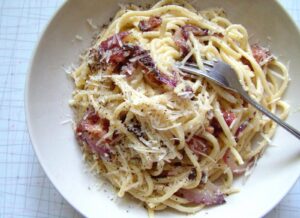Carbonara is one of Rome’s four classic pastas and although its origins are uncertain, theories include that it was invented by Italian carbonari (charcoal workers) who prepared the dish on their shovels over a fire or that it was a marrying of traditions between American soldiers in Italy during World War II and their bacon and egg rations with the local pasta dishes.
Either way, what distinguishes carbonara from other pasta dishes is its technique of combining eggs, hard cheese, cured pork, and black pepper into a rich, silky sauce.
Ingredients:
-
-
3 Tbsp. Kosher salt (Coarse Sea Salt), plus more for seasoning
-
4 oz. diced guanciale (salt-cured pork jowl), pancetta (Italian bacon), or bacon
-
2 oz. Pecorino
-
4 large egg yolks
-
2 large eggs
-
Freshly ground black pepper
-
2 Tbsp. extra-virgin olive oil
-
1 lb. spaghetti, bucatini, or rigatoni
-
Prepared by Alyssa Madaire,
Springbank Cheese’s Culinary Specialist,
Buy your Pecorino, or try Parmesan for a more traditional recipe
Directions:
-
In a large pot, bring heavily salted water to a boil.
-
Render the guanciale in the olive oil until golden brown and slightly crispy on medium heat in a heavy-bottomed pan, about 5-8 minutes. Drain the fat from the meat, reserving 3-tablespoons of fat in the pan
-
While the meat renders, boil the pasta until al dente
-
Mix the egg yolks and eggs in a bowl until smooth, no streaks remain. Stir in the grated pecorino and the freshly ground black pepper.
-
Once the pasta is al dente, drain and reserve ¾ cup of the pasta cooking liquid. Place the pasta into the heavy-bottomed pan with the reserved fat.
-
Whisk in ¼ cup pasta cooking liquid to the egg mixture, then slowly pour into the pasta while mixing quickly.
-
If required, add small amounts of the pasta cooking liquid until desired consistency is achieved. Toss with guanciale and add salt and black pepper to taste.
-
Top with a sprinkle of freshly grated pecorino and a crack of black pepper, serve hot.
Serves: 4

